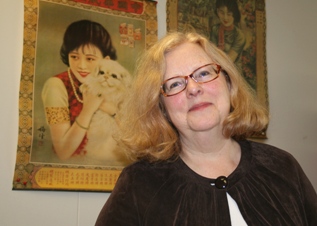By Katie Land, news editor
 |
| Oakland University's Linda Benson discussed the recent ethnic clashes in China on NPR and other radio shows. |
As an expert on minority studies and inner China, Oakland University’s Linda Benson has garnered national attention on NPR’s “Morning Edition,” in a Washington Post article and a flurry of other radio shows across the country as the ethnic clashes in China continue to make headlines.
The history professor and Master of Arts in Liberal Studies director was interviewed for the national radio show on July 8. Follow-up interviews for other radio shows took place July 14 for “Radio Times with Marty Moss-Coane” on Philadelphia’s NPR affiliate and July 15 for “New American Now” in San Francisco. Another is scheduled for July 21 for “Focus 580” on Illinois Public Media.
The interviews center on the recent ethnic clashes in China’s Xinjiang region, which have left more than 150 dead. The conflict is between the Han Chinese and the Muslim Uighurs, a Turkic-speaking minority group more closely associated with Central Asian cultures than the Chinese.
“I wondered what the coverage would be like,” Benson said of the media’s request for experts. “But the story continued to make headlines as events unfolded and continued to unfold. There has been a large interest in the media and it was a bit of a surprise to see how much attention it has received.”
Similar incidents have occurred in the last few decades, but had virtually no outside coverage and disappeared fast, Benson said. She attributes the change to how China has made itself more accessible to foreign reporters and to the increasing population of American businesspeople living in the region.
Calling the Uighurs a “distinct people” in the NPR interview, Benson explains the history of the region and other social and political factors leading up to the current violence. “What we are seeing now is the fallout from bringing a new territory and new people into any kind of modern state. Those are the tensions that come with that process,” she said.
“There have been ongoing tensions all through the 20th century, I have to say,” Benson continued. “After 1980, things began to open up in China, and things did improve in many ways. Part of the problem has come with restrictions placed by the government, viewed by some of the Uighurs as really impinging on their religious freedoms.”
Benson’s interest in China and Chinese culture was sparked by a course she took as an undergraduate student. She moved to Hong Kong shortly after to pursue her master’s degree. Soon, Benson was trying to research and uncover information about the little-known ethnic minorities of northwestern China.
“It is a fascinating region,” she said. “It is a crossroads where the Han Chinese meet with the long cultural tradition of the Uighurs, who have been Muslim in that area for the last thousand years. It has been a place difficult to access as late as 1986 – you simply could not get there. Travelers needed special authorizations.”
Benson has seen a number of colleagues' names show up in various publications and media outlets over the past few weeks. It is a good outlet to show the western world that a lot of people are studying the area and creating a wider field of knowledge, she continued.
Celebrating her 20th year at Oakland this year, Benson plans to incorporate this summer’s events and its Western media coverage into student discussions in her fall courses. She said that the increased freedom for journalists brings additional Western issues into the conversation.
“It is difficult to provide context for such a complicated matter,” Benson said. “It is very tricky to provide a balanced account.”
Benson has written several books about ethnic minorities and gender studies in modern China, and participated in a 2004 Fulbright Hays Group Project trek throughout the major regions of Mongolia. She has also participated in a handful of other radio shows over the years on Voice of America and Free Asia broadcasts.
Listen to Benson’s interview at the
NPR Web site.

